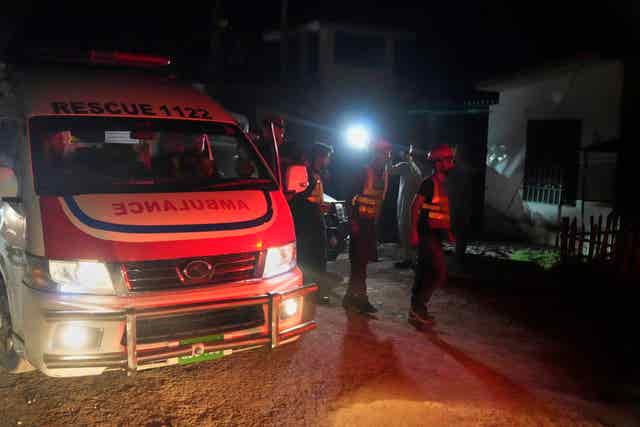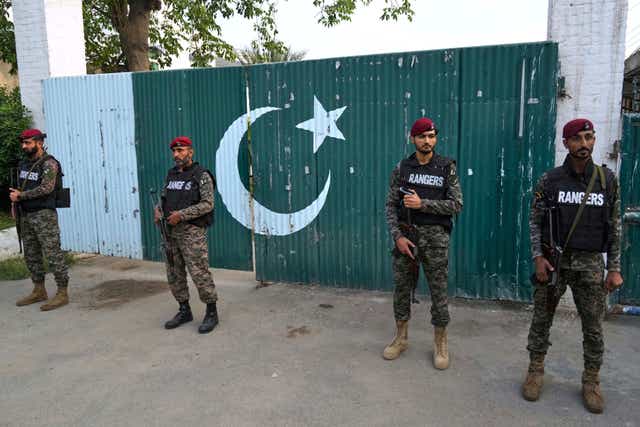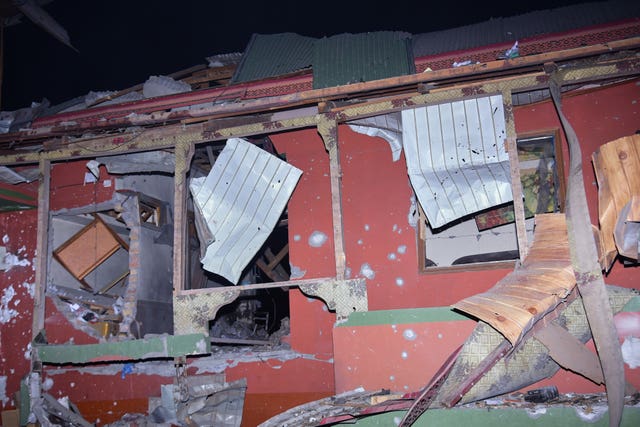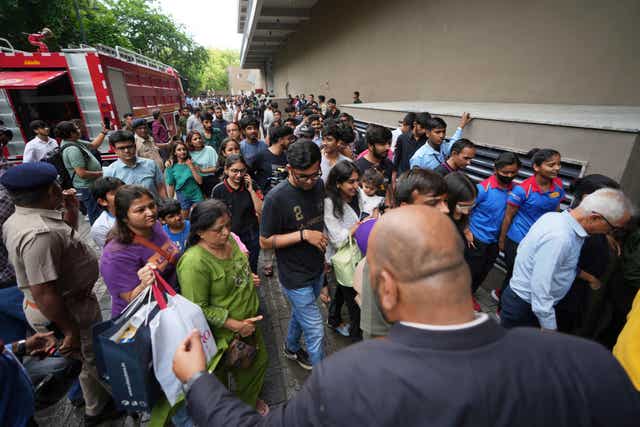Pakistan labels Indian missile strikes ‘act of war’
The strikes targeted at least nine sites ‘where terrorist attacks against India have been planned’, India’s defence ministry said.

India fired missiles at Pakistan early on Wednesday, in what it said was retaliation for last month’s massacre of Indian tourists. Pakistan called the strikes an act of war and claimed it had downed several Indian fighter jets.
The strikes targeted at least nine sites “where terrorist attacks against India have been planned”, India’s defence ministry said.
Pakistan’s military said the missiles hit six locations in Pakistan-administered Kashmir and in the country’s Punjab province and killed more than two dozen people, including children.
Pakistan said it reserved the right to respond, raising the spectre that the back-and-forth could spiral into all-out conflict. Already, it is the worst confrontation between the rivals since 2019, when they came close to war.
Following the strikes, there was a heavy exchange of fire that officials in each country said left more people dead. Three planes fell onto villages in India-controlled territory, according to Indian police and residents, although it was not immediately clear if they were downed by Pakistan.
Tensions have soared between the nuclear-armed neighbours since an April attack in which gunmen killed 26 people, mostly Indian Hindu tourists, in India-controlled Kashmir, in some cases killing men before their wives’ eyes.
India accuses Pakistan of being behind the attack, which was claimed by a militant group calling itself Kashmir Resistance. India has said the group is linked to Lashkar-e-Taiba, a disbanded Pakistani militant group.

India and Pakistan have fought two of their three wars over the Himalayan region of Kashmir, which is split between them and claimed by both in its entirety.
In the wake of the massacre, the rivals have expelled each other’s diplomats and nationals, closed their borders and shut down airspace. India has also suspended a critical water-sharing treaty with Pakistan.
Pakistani prime minister Shehbaz Sharif condemned the airstrikes and said his country would retaliate.
“Pakistan has every right to give a robust response to this act of war imposed by India, and a strong response is indeed being given,” Mr Sharif said.
He said his country would avenge the dead but gave no details, fanning fears of all-out conflict between the two countries.
It was not clear if Pakistan’s claim that it had shot down fighter jets constituted its retaliation or if more might be coming.

The country’s national security committee said Pakistan reserved the right to respond “in self-defence, at a time, place, and manner of its choosing”.
The statement said the strikes were carried out “on the false pretext of the presence of imaginary terrorist camps” and said they killed civilians.
South Asia analyst Michael Kugelman said the strikes were some of the highest-intensity ones from India on its rival in years and that Pakistan’s response would “surely pack a punch as well”.
“These are two strong militaries that, even with nuclear weapons as a deterrent, are not afraid to deploy sizeable levels of conventional military force against each other,” Mr Kugelman said.
“The escalation risks are real. And they could well increase, and quickly.”
In 2019, the two countries came close to a war after a Kashmiri insurgent rammed an explosive-laden car into a bus carrying Indian soldiers, killing 40. India carried out airstrikes in Pakistani territory, and Pakistan shot down an Indian warplane and captured the pilot, later releasing him.
US President Donald Trump called the escalating conflict “so terrible” and urged both sides to stop the violence.
UN secretary-general Antonio Guterres called for maximum restraint because the world could not “afford a military confrontation” between India and Pakistan, according to a statement from spokesperson Stephane Dujarric.
China also called for calm. Beijing is the largest investor in Pakistan by far and has multiple border disputes with India, including one in the northeastern part of the Kashmir region.
Pakistan’s national security committee met on Wednesday morning. Indian prime minister Narendra Modi held a special meeting of the cabinet committee on security and postponed his upcoming trip to Norway, Croatia and the Netherlands.
Several Indian states held civil defence drills on Wednesday to train civilians and security personnel to respond in case of attack.
The missile strikes hit six locations and killed at least 26 people, including women and children, Pakistan’s military spokesperson, Lieutenant General Ahmed Sharif, said.
Officials said another 38 people were injured in the strikes, and five more people were killed in Pakistan during exchanges of fire across the border later in the day.

Indian jets damaged infrastructure at a dam in Pakistan-administered Kashmir, according to Lt Gen Sharif, the military spokesman, calling it a violation of international norms.
The strikes also hit close to at least two sites previously tied to militant groups that have since been banned, according to Pakistan. One hit Subhan Mosque in Punjab’s Bahawalpur city, killing 13 people, according to Zohaib Ahmed, a doctor at a nearby hospital.
The mosque is near a seminary that was once the central office of Jaish-e-Mohammed, a militant group outlawed in 2002. Officials say the group has had no operational presence at the site since the ban.
Another missile hit a mosque in Muridke in Punjab, damaging it. A sprawling building located nearby served as the headquarters of Lashkar-e-Taiba until 2013, when Pakistan banned the militant group and arrested its founder.
India’s defence ministry called the strikes “focused, measured and non-escalatory in nature”.
“No Pakistan military facilities have been targeted,” the statement said, adding that “India has demonstrated considerable restraint”.

Along the Line of Control, which divides the disputed region of Kashmir between India and Pakistan, there were heavy exchanges of fire.
Indian police and medics said 12 civilians were killed and at least 40 wounded by Pakistani shelling in Poonch district near the highly militarised de facto border. At least 10 civilians were also injured in Kashmir’s Uri sector, police said.
Shortly after India’s strikes, aircraft fell in three villages: two in India-controlled Kashmir, a third in India’s northern Punjab state.
Lt Gen Sharif said the country’s air force shot down five Indian jets in retaliation for the strikes. There was no immediate comment from India about Pakistan’s claim.
Debris from one plane was scattered across one village, including in a school and a mosque compound, according to police and residents. Firefighters struggled for hours to douse the resulting blazes.
Another aircraft fell in an open field in Bhardha Kalan village.
A third aircraft crashed in a farm field in Punjab, a police officer told The Associated Press.





